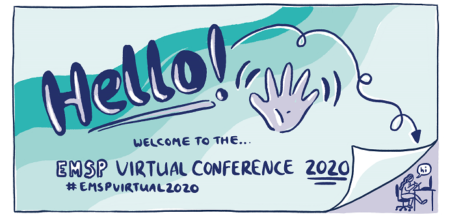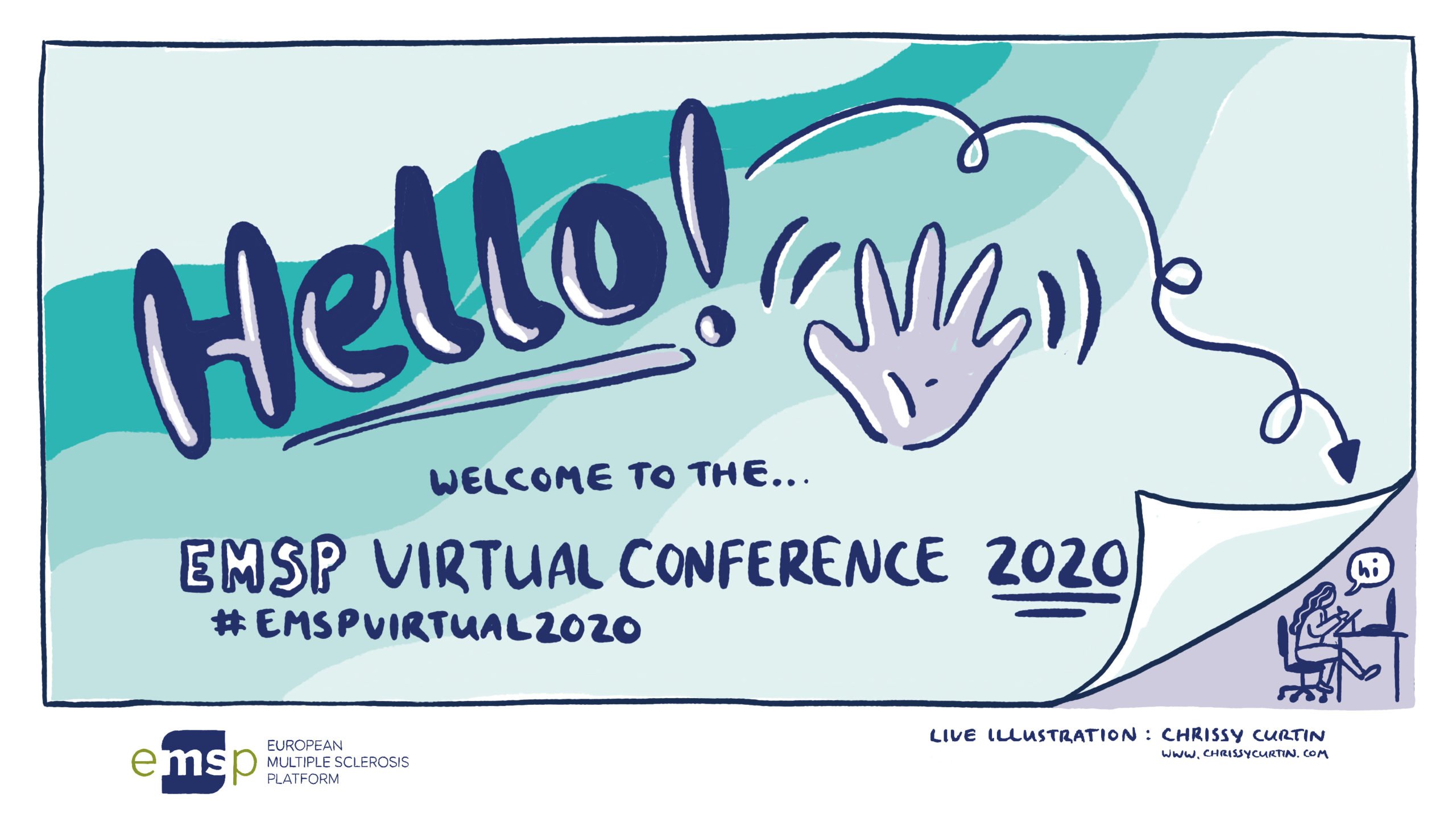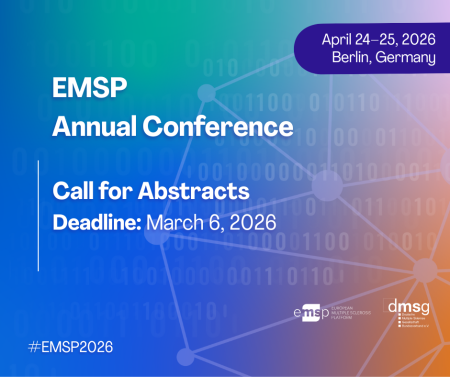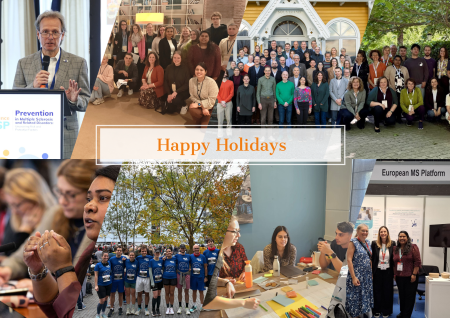
#EMSPVirtual2020 Summary
31.03.2021Mid-November was not the usual time for an EMSP conference. In the last weeks of 2020, the European MS community gathered for ‘Understanding Progressive Multiple Sclerosis (MS)’.

Chrissy Curtin, an illustrator, enlivened the conference with her work. You can her work before playing any of the recordings.
There were more than 500 attendees from Europe and across the globe, the topics included developments in treatments, communication between healthcare professionals and patients, staying professionally active, being a young person with MS, aging, and staying empowered post-diagnosis. It was online, people were all isolated in their homes or offices but thanks to the great work of Downtown Europe, the line-up of neurologists, rehabilitation experts, healthcare professionals, people with MS, allies, and advocates, revived the passions and energy of all in attendance.
The Complexities Surrounding Progressive MS
Diagnosis of Progressive MS is challenging for everyone, devastating for many and difficult for all. Individuals with MS spoke with great clarity and power about their experiences. Christiane Tihon from Belgium emphasized the need to stay focused on living and keeping going; she is a remarkable contributor to the work of the Belgian MS organisation. Ms Tihon spoke on the importance of inclusivity, wellbeing, and her own personal acceptance by avoiding the labels “patient” and “disease”. Building a lifestyle with a positive mindset, making adaptations when necessary to stay at work, fostering personal resilience and having a sense of purpose all play an important role in maintaining or improving a person’s quality of life.
Highlights in Research on Progressive MS
Professor Mar Tintore (Clinical Coordinator at Neurology-Neuroimmunology at CEMCAT presented Highlights on Research on Progressive MS and spoke on the impact of early treatment and rehabilitation to prevent progression. Prof. Tintore, spoke about how brain reserve capacity can affect the delayed manifestation of MS. While drugs like Siponimod and Ocrelizumab work with an anti-inflammatory effect, other medications that alleviate symptoms through different mechanisms, are not yet available to patients with Primary Progressive MS. The ongoing COVID-19 pandemic has affected drug development as the risk of infection is a genuine concern in treatment. The Progressive MS Alliance, a network of international investigators and allies, is working on expanding the efforts of these treatments in the pipeline.
Latest developments on Progressive MS
The latest developments on Progressive MS were presented by Professor Francisco Quintana, Professor of Neurology at Harvard Medical School and member of the Progressive MS Alliance, explained the rationale behind identifying novel mechanisms for new treatments. In an intensive and detailed presentation, he spoke on how research is underway to not only understand the role of astrocytes in the limitation of inflammatory cells but to also investigate its pathogenic effects in activating neurotoxic activities for individuals with MS. The approach of identifying subpopulations of astrocytes on top of understanding the “gut to brain” axis may provide more specific targeting of astrocytes to limits their pathogenic activities. Monitoring inflammation activity could be a very useful diagnostic approach that would take account of the clinically silent but impactful progression that can, and often does, lead to severe disability.
Aging with Progressive MS
Chairman & Director at Dept. of Neurology-Neuroimmunology, Multiple Sclerosis Centre of Catalonia (CEMCAT), Dr. Xavier Montalban spoke on an issue that matters to everyone- getting older. Approximately 30% of people with Primary Progressive MS are over 55. Some of the issues raised included staying independent, financially secure and maintaining good health. However, one of the challenges healthcare professionals is determining the efficacy of Disease-Modifying Drugs (DMDs) provided to individuals with MS in this age range. The key recommendations is to maintain a healthy lifestyle with a particular emphasis on exercise, complementary lifestyle modifications, and attending physiotherapy to maintain function.
Rehabilitation Trends in Europe
Access to rehabilitation is vital to provide better healthcare support for individuals with Progressive MS, Professor Daphne Kos, Professor at Rehabilitation in MS (RIMS) & National MS Center Melsbroek & KU Leuven. She emphasized the importance of a multi-dimensional and multi-professional health care approach. This approach takes into account symptom management, access to treatment, tailored support, sustainability and care coordination.
Rehabilitation also includes fatigue management, occupational therapy, and providing mental health support to individuals so they can continue to reach their personal goals. The current pandemic situation has replaced physical rehabilitation with telerehabilitation for some people with MS. However, not everyone has access to online rehabilitation support and further exploration is required to evaluate its effectiveness.
Just do it!
Alexis Donnelly is Assistant Professor of Computer Science at Trinity College and spoke about his experience living with Progressive MS. Not only has he continued with his career, he spoke to the audience in a way that reminded one and all of the importance of making the most of our lives, even in the face of the most difficult challenges.
Day 2 of EMSP2020
The second day of the conference began with a lively discussion between Megan Roberts (MS Nurse and Head of Health Professionals Programme at MS Trust), Donna Nahal (Patient Advocate), Piet Elen (Clinical Nurse Specialist at National Multiple Sclerosis Center Melsbroek) and Chrysa Chrysovitsanou (Supervisor MS clinic, MS Nurse at Eginitio Univertisy Hospital). Accessing the right healthcare at the right time and with the right professionals, overcoming barriers and the issues faced by people from minority communities and communication gaps, were just some of the topics covered by the expert speakers.
Mental health & resilience
Being diagnosed with progressive MS can be a traumatic experience. For many depression is a co-morbidity 27-53%. The ongoing issues of mood disorders the condition brings, can play a serious toll on people‘s mental health. Clinical Neuropsychologist Fabiola Garcia Vaz presented on how ways people deal with the psychological impact with strategies for dealing with emotions, ways to build resiliance and how developing self-knowledge can positively impact the overall wellbeing of an individual.
To work or not to work
This issue is closely connected to the final plenary of the conference, To Work or not to Work. Emma Rogan (EMSP) facilitated the discussion with Mercedes Simon Benito, Finance Manager at Laboratorio STADA about the priorities for her as an employer, focusing on what the person can do and supporting them to do their work. Aleksandra Kozak and Jacob Santamarta Barral members of the EMSP Young People’s Network shared their personal experiences. Points from this session included recommendations for focusing on their work and financial security, not disclosing their MS diagnosis/symptoms until they are ready and until necessary and being able to readjust to changes in their symptoms by accessing support from their local MS organisation and from healthcare providers.
Young people’s session behind closed doors
Young people with MS got together at the end of this conference in a closed-door session to talk about the issues that matter to them. Mental health, resilience and building communities of change, were some of the ways to further enhance their tools for living well.

A huge shout-out to everyone involved
After 1.5 days of presentations, discussions and sharing of expertise, EMSP2020 closed. Thank you to all presenters for their contributions, to the attendees for their support, Downtown Europe and B2Match for providing the tools to make this conference happen and thank you to every person with MS who has given their time to make a different to others.
Finally, thank you to EMSP sponsors Biogen, BMS, Roche, Merck, Novartis, Sanofi-Genzyme, for supporting our work and giving us the resources to bring EMSP2020 to the European public and MS Community. We know that despite the pandemic, there are no barriers to bringing the great energy of EMSP to the wider world. See you again in 2021!
 Your Account
Your Account


